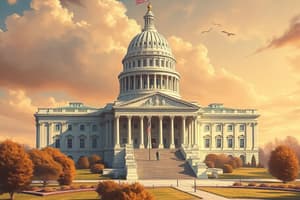Podcast
Questions and Answers
What is the minimum number of votes required for a bill to pass in the House of Representatives?
What is the minimum number of votes required for a bill to pass in the House of Representatives?
- 218 (correct)
- 230
- 201
- 250
What role does the president have in the legislative process after a bill has passed both houses?
What role does the president have in the legislative process after a bill has passed both houses?
- The president can suggest amendments to the bill.
- The president can create new bills.
- The president can sign or veto the bill. (correct)
- The president can override Congressional votes.
Which committees in the Senate generally handle legislative matters?
Which committees in the Senate generally handle legislative matters?
- Joint committees
- Select committees
- Temporary committees
- Standing committees (correct)
What is a required majority for Congress to override a presidential veto?
What is a required majority for Congress to override a presidential veto?
Which entity has the power to impeach federal officials, including the president?
Which entity has the power to impeach federal officials, including the president?
How many permanent committees does the Senate have?
How many permanent committees does the Senate have?
What occurs after both the House and Senate pass different versions of a bill?
What occurs after both the House and Senate pass different versions of a bill?
Who oversees the impeachment proceedings of a federal official?
Who oversees the impeachment proceedings of a federal official?
What main purpose does the legislative branch serve in the U.S. government?
What main purpose does the legislative branch serve in the U.S. government?
How many voting members are currently in the House of Representatives?
How many voting members are currently in the House of Representatives?
What is the primary function of the Senate as established in the Constitution?
What is the primary function of the Senate as established in the Constitution?
Who originally chose Senators before the 17th amendment was passed?
Who originally chose Senators before the 17th amendment was passed?
What does a proposed law need to go through before being voted on by the full Congress?
What does a proposed law need to go through before being voted on by the full Congress?
What is the term length for a Senator?
What is the term length for a Senator?
Why is having a bicameral legislature significant in the U.S. government?
Why is having a bicameral legislature significant in the U.S. government?
Which power is specifically granted to the House of Representatives?
Which power is specifically granted to the House of Representatives?
Flashcards are hidden until you start studying
Study Notes
The Legislative Branch
- The U.S. Constitution establishes three branches of government: legislative, executive, and judicial.
- The legislative branch is responsible for writing laws.
- The legislative branch is bicameral, meaning it has two chambers: the House of Representatives and the Senate.
- The House of Representatives has 435 voting members.
- The Senate has 100 members, with two senators per state.
- The House of Representatives is responsible for initiating revenue bills, impeaching federal officials, and electing the president in the case of an electoral college tie.
- The Senate is responsible for confirming presidential appointments and ratifying treaties.
The Legislative Process
- A bill is proposed by a Representative.
- The bill is studied by a committee.
- If approved by the committee, the bill is debated and voted on by the House of Representatives.
- If the bill passes the House, it moves to the Senate.
- The Senate debates, amends, and votes on the bill.
- If the bill passes the Senate, any differences between the House and Senate versions are reconciled.
- The final bill is sent to the president for approval or veto.
The Relationship Between the President and Congress
- The president proposes a budget, but Congress decides how much is spent and where.
- The president can veto legislation, but Congress can override the veto with a two-thirds majority.
- The president makes treaties with foreign powers, which are subject to Congressional approval.
The Judicial Branch
- The president appoints Supreme Court justices, but the Senate approves or disapproves those appointments.
- The House of Representatives can impeach federal officials, including the president.
- The Senate tries impeachment cases, with the Chief Justice of the Supreme Court presiding.
- A two-thirds majority vote in the Senate is required to convict and remove an official from office.
Studying That Suits You
Use AI to generate personalized quizzes and flashcards to suit your learning preferences.




